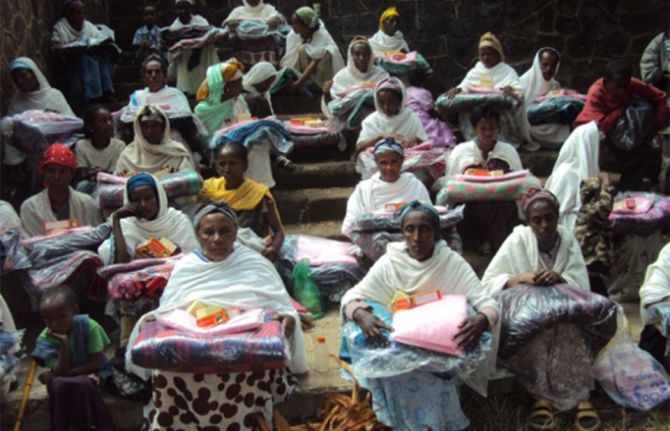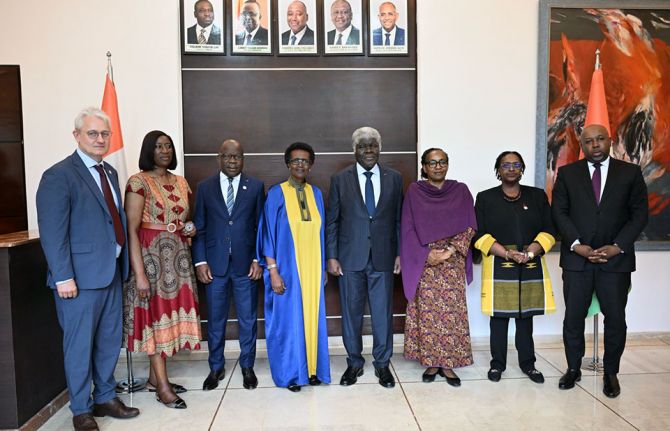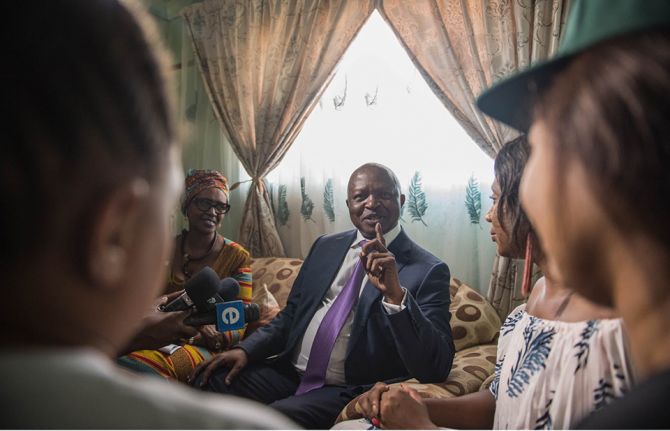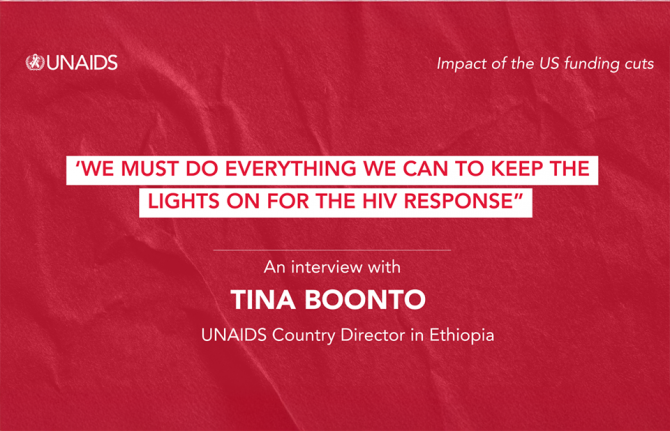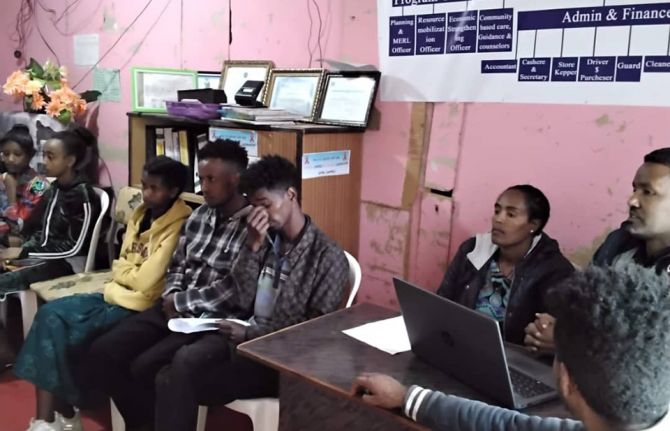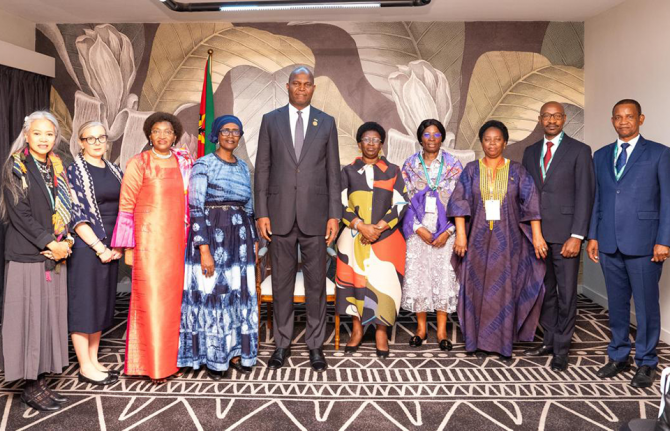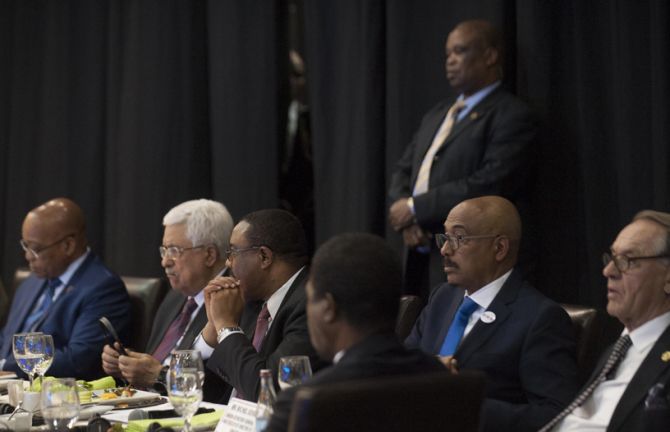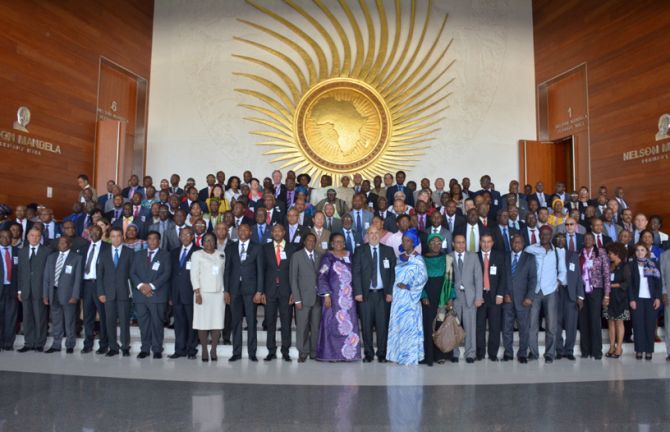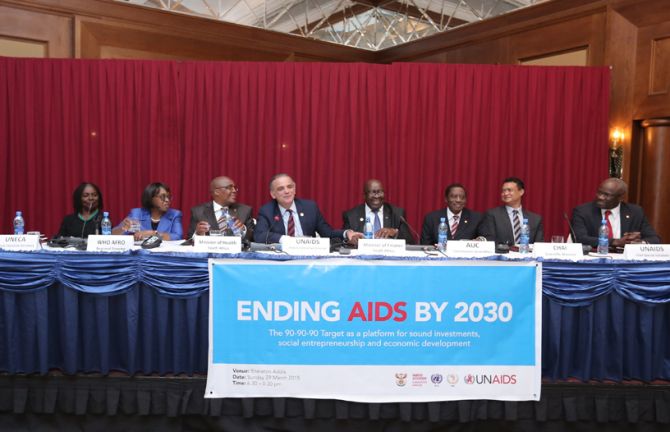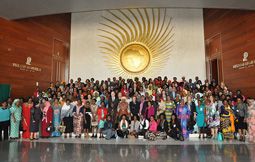
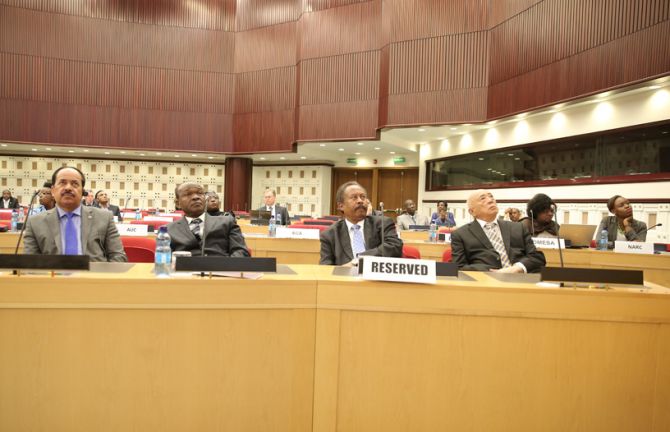
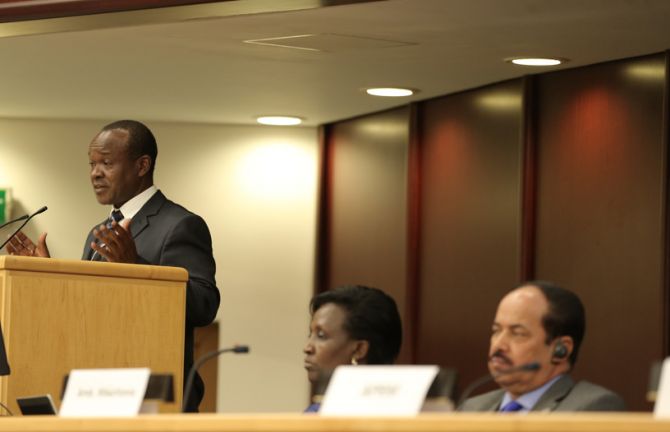
Update
Leaders call for an African road map to end the AIDS epidemic by 2030
27 November 2014
27 November 2014 27 November 2014Leaders of key continental, regional and national institutions concluded that the AIDS epidemic remains a key priority for Africa and must be ended by 2030 in the continent during a High-level Dialogue on Ending AIDS, held on 24 November in Addis Ababa, Ethiopia. The dialogue was hosted by the African Union Commission, the United Nations Economic Commission for Africa and UNAIDS as part of activities to commemorate World AIDS Day 2014.
During the meeting, participants discussed the recommendations in the new UNAIDS report Fast-Track: ending the AIDS epidemic by 2030 and encouraged countries to embrace the targets set to end the AIDS epidemic by 2030. To achieve this goal, participants made several recommendations, which include ensuring the effective use of existing continental accountability mechanisms, such as AIDS Watch Africa and the African Peer Review Mechanism; focusing on innovative ways of increasing domestic financing for health; ensuring sustained access to medicines through local production of drugs; integrating AIDS as part of broader health and development; and ensuring national HIV programmes tailored for young people and populations at higher risk of HIV infection.
Participants of the meeting included ambassadors of African Union Member States, representatives of the African Union Commission, regional economic communities, the African Peer Review Mechanism, AIDS Watch Africa, civil society organizations and development partners, and key opinion leaders, academics and young people.
Quotes
“Ending AIDS is Africa’s responsibility, everyone’s responsibility and indeed a global responsibility.”
“The battle against HIV and AIDS is ours to win.”
“The African Peer Review Mechanism not only assesses and monitors the extent to which commitments are implemented, it also provides the opportunity for policy-makers and ordinary citizens to hold each other accountable.”
“We must step up our efforts in the AIDS response—there must be no room for complacency.”
“We, the youth movement, ask our leaders to walk away from this dialogue with these commitments—action towards adopting targets for universal sexual and reproductive health and rights, and ending the AIDS epidemic by 2030 in the post-2015 development agenda.”
“The commitment to end the AIDS epidemic is already there. What we now need is a clear strategy to achieve this ambitious target.”
Region/country
Related

Press Release
African First Ladies unite to ensure that all children are born HIV-free
26 November 2014 26 November 2014The First Ladies of Africa call on governments and communities to ensure that all babies in Africa are born and stay free of HIV.
GENEVA, 26 November 2014—Ahead of World AIDS Day 2014, the Organisation of African First Ladies Against HIV/AIDS (OAFLA) and the Joint United Nations Programme on HIV/AIDS (UNAIDS) have launched a campaign to stop new HIV infections among children and ensure that their mothers stay healthy. The campaign was launched in association with the African Broadcast Media Partnership.
“Many countries are giving us hope that we can end the AIDS epidemic on the African continent and around the world,” said the First Lady of the Republic of Chad and President of OAFLA, Hinda Deby Itno. “We must continue to intensify our efforts, as too many children in Africa are born with HIV every day. The prosperity of our continent depends on a healthy generation.”
In recent years, country-led movements in sub-Saharan Africa have resulted in a significant decrease in new HIV infections among children. An estimated 210 000 children in sub-Saharan Africa were newly infected with HIV in 2013 compared to 370 000 in 2009, a decline of 43%.
Coverage of services to prevent mother-to-child transmission of HIV in the region reached 68%, up from 56% in 2011. Despite this progress, there is still a need to strengthen community-led HIV responses in order to ensure universal access to life-saving medicines for both mothers and their children, as in 2013 only 22% of children had access to the medicines.
“The First Ladies of Africa have started a powerful movement to ensure that no more babies are born with HIV in Africa,” said Michel Sidibé, Executive Director of UNAIDS.” We must fast-track our efforts to end the AIDS epidemic by 2030. There is no greater return than investing in the health and development of a nation.”
The First Ladies’ broadcast and social media campaign reinforces the need for strong leadership, shared responsibility and concerted community action to stop new HIV infections among children. The First Ladies’ call for active community involvement, including women living with HIV and their partners, policy-makers and health-care providers, to achieve the targets set out in the Global Plan towards the elimination of new HIV infections among children by 2015 and keeping their mothers alive.
Launched at the 2011 United Nations High-Level Meeting on AIDS, the Global Plan identified 22 priority countries—21 of which are in sub-Saharan Africa—in which to redouble efforts to reduce the number of children born with HIV by 90% by 2015.
The campaign also aims to increase access to antiretroviral therapy for children. As of 2013, Botswana was the only priority country that was providing treatment to more than 80% of children living with HIV, while three other countries reached more than 40% treatment coverage for children under 15 years in 2013.
The campaign will be broadcast over 150 radio stations and more than 100 TV stations across 38 countries in Africa over the next 12 months. It will also be launched on several social media outlets to reach communities beyond the African continent.
UNAIDS
The Joint United Nations Programme on HIV/AIDS (UNAIDS) leads and inspires the world to achieve its shared vision of zero new HIV infections, zero discrimination and zero AIDS-related deaths. UNAIDS unites the efforts of 11 UN organizations—UNHCR, UNICEF, WFP, UNDP, UNFPA, UNODC, UN Women, ILO, UNESCO, WHO and the World Bank—and works closely with global and national partners to maximize results for the AIDS response. Learn more at unaids.org and connect with us on Facebook and Twitter.
OAFLA
The Organisation of African First Ladies Against HIV/AIDS (OAFLA) was established in 2002 as a collective voice for Africa’s most vulnerable people, women and children infected and affected by the HIV pandemic. Since then, OAFLA has transformed itself from a forum of ideas to an institution capable of providing the continent-wide leadership needed to bring about change in peoples’ lives. With its permanent secretariat in Addis Ababa, Ethiopia, OAFLA has moved from addressing the symptoms of the HIV crisis to the root causes, poverty and the overall inequality of women in the region. For more information, visit www.oafla.org.
Contact
UNAIDS Johannesburg | Zenawit T. Melesse | tel. +27 11 519 6931 | melessez@unaids.org
UNAIDS Dakar | Jeanne Seck | tel. +221 338 692 983 | seckj@unaids.org
OAFLA Secretariat Addis Ababa | Nardos Berhanu | tel. +251-911-657261 | nardos@oafla.org
Multimedia
Press centre
Download the printable version (PDF)

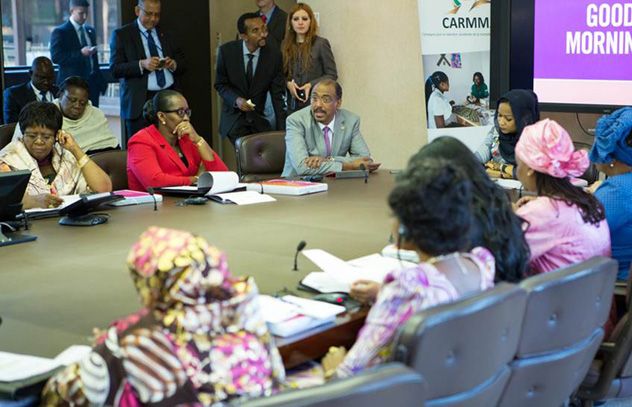
Update
African first ladies renew commitment toward the AIDS response in the continent
23 September 2014
23 September 2014 23 September 2014The Organisation of African First Ladies Against HIV/AIDS (OAFLA) recently met in New York to discuss how they can scale-up their efforts towards ending the AIDS epidemic in Africa.
The First Ladies met at the Ford Foundation in New York on the sidelines of the 69th session of the United Nations General Assembly where they deliberated on effective solutions to maintain high-level commitment to ending the AIDS epidemic.
The First Ladies highlighted the need to scale-up comprehensive maternal and new-born health services which integrate HIV testing for pregnant women and provide access to antiretroviral medicines during pregnancy, delivery and which extend through the breastfeeding period.
OAFLA has recently launched a new strategic plan which highlights the urgent need to integrate HIV services into existing sexual and reproductive health services. The First Ladies agreed that targets related to stopping new HIV infections among children cannot be met if the wider context of preventing new HIV infections among women and girls is not addressed.
OAFLA was originally established in 2002 as a collective voice to support people living with and affected by HIV. Over the last 12 years, the first ladies have engaged in awareness raising campaigns and advocacy initiatives in their respective countries.
Quotes
“We should intensify our collaboration with UNAIDS at the global, regional and country level to mobilize our communities to end the AIDS epidemic on our continent.”
“We have been working with UNAIDS for over a decade, our partnership is really maturing and taking shape. Our immediate focus should be about the 19 million people who do not know their HIV status. All successes we have achieved will be reversed if we do not address this issue.”
"Women across the continent still do not have the power to make personal decisions that many of us take for granted. We have to make sure that they are able to decide when to have children and the right to determine their futures. I certainly don’t want my daughter to have the same life as my grandmother when it comes to the empowerment of women."
“UNAIDS launched the 90-90-90 campaign to support country efforts in ending the AIDS epidemic as a public health threat by 2030. To reach this goal, we have to continue our strategic alliance with OAFLA and make sure that all people, particularly women know their HIV status and are able to protect themselves and their families.”
Documents
Michel Sidibé adresses African Nations at their 50th anniversary
The heads of seven African states were in Yaoundé at the invitation of Cameroon’s President Paul Biya to celebrate the 50th anniversary of their countries’ independence on Thursday. The seven leaders also took part in the closing ceremony of the international conference “Africa 21” on Wednesday evening.
Related
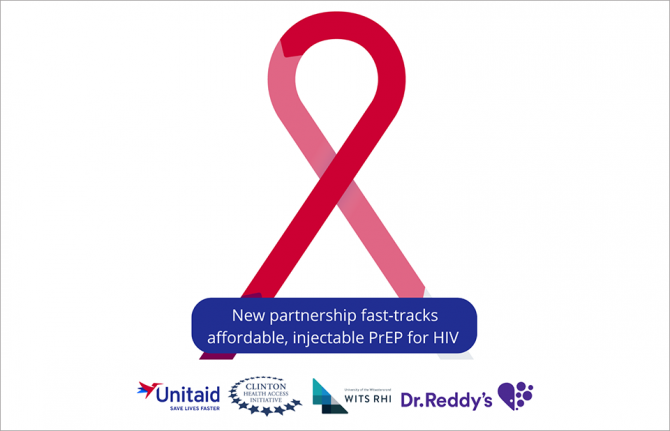 UNAIDS welcomes the announcement of new deals to make new HIV prevention medicines available and affordable for people in need
UNAIDS welcomes the announcement of new deals to make new HIV prevention medicines available and affordable for people in need

24 September 2025
What can modelling tell us about the scale-up of lenacapavir for pre-exposure prophylaxis?
18 September 2025
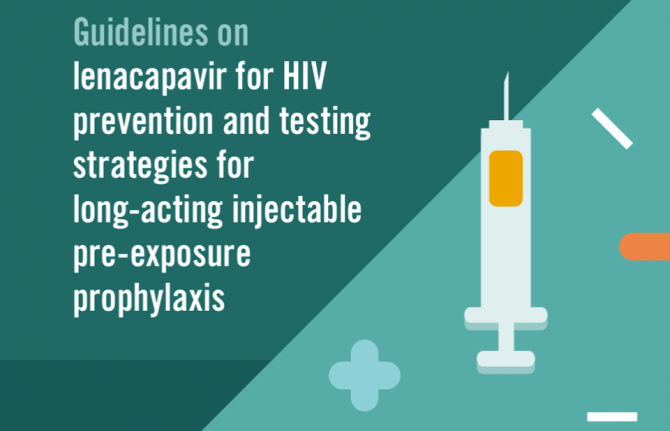 UNAIDS welcomes new WHO guidelines on Lenacapavir
UNAIDS welcomes new WHO guidelines on Lenacapavir

15 July 2025
 “Who will protect our young people?”
“Who will protect our young people?”

02 June 2025
Documents
African Ministers meet to discuss 21st century challenges
The first session of the Joint Annual Meetings of the African Union Conference of Ministers of Economy and Finance and the United Nations Economic Commission for Africa Conference of Ministers of Finance, Planning and Economic Development is taking place in Addis Ababa, Ethiopia from 31 March to 2 April 2008. The conference will also mark the start of a yearlong commemoration of the Economic Commission for Africa’s 50th anniversary. As part of the celebrations, participants, including selected African Heads of State and Government and other eminent persons, will be invited to reflect on the theme of the Conference, ‘Meeting Africa’s New Challenges in the 21st Century’.
Related
Documents
Celebrating fifty years of African unity
Leaders from across Africa and beyond are gathering for a special African Union (AU) summit which marks the 50th anniversary of unity on the continent. Several meetings and side-events took place during the Summit (19-27 May 2013).
Related
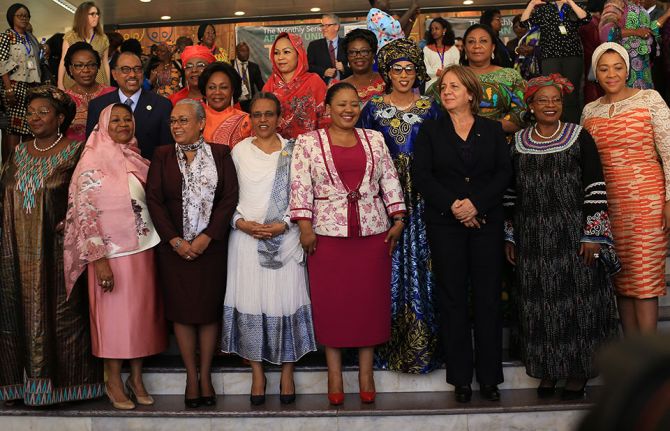 African first ladies and the African Union launch Free to Shine
African first ladies and the African Union launch Free to Shine

06 February 2018
AUcampaignpagebanner
17 June 2015
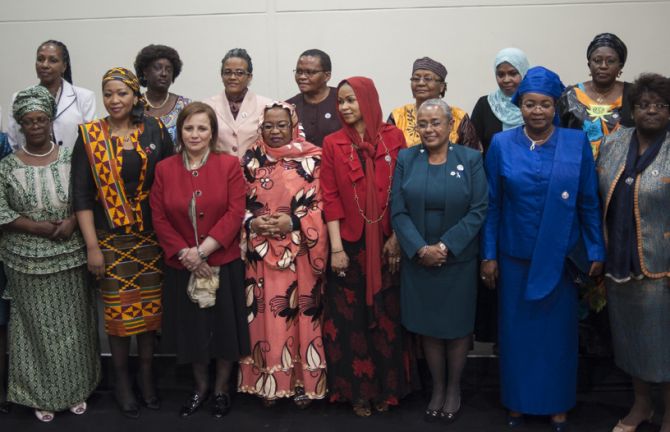 African First Ladies advocate for the ending AIDS epidemic among young women and adolescent girls
African First Ladies advocate for the ending AIDS epidemic among young women and adolescent girls

16 June 2015
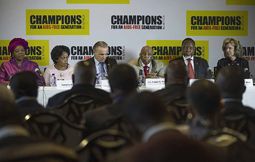 Champions come together to announce strengthened efforts for an AIDS-free generation in Africa
Champions come together to announce strengthened efforts for an AIDS-free generation in Africa

13 April 2015
Documents
20th African Union Summit
During the 20th African Union Summit, UNAIDS Executive Director Michel Sidibé participated in a series of meetings with Heads of State and other high-level African dignitaries in Addis Ababa, Ethiopia.
Related
ICASA 2017
06 December 2017
72nd UN General Assembly, 19-25 September 2017
22 September 2017
Benin
03 March 2017
71st United Nations General Assembly
23 September 2016
High-Level Meeting on Ending AIDS
16 June 2016
AUcampaignpagebanner
17 June 2015
Documents
UNAIDS commends leadership of AIDS Watch Africa ahead of African Union Summit
Ahead of the 19th African Union Summit, UNAIDS Executive Director Michel Sidibé participated in a series of meetings with Heads of State and other high-level African dignitaries on 14 July in Addis Ababa, Ethiopia.
Related
 “Who will protect our young people?”
“Who will protect our young people?”

02 June 2025
What the data tell us: Projections for the HIV epidemic in the Middle East and North Africa in 2030
28 March 2025
What the data tell us: Projections for the HIV epidemic in western and central Africa in 2030
28 March 2025
What the data tell us: Projections for the HIV epidemic in eastern and southern Africa in 2030
28 March 2025
 Impact of US funding cuts on HIV programmes in Uganda
Impact of US funding cuts on HIV programmes in Uganda

19 March 2025
Documents
Highlights from the African Union Summit
UNAIDS Executive Director Michel Sidibé met with a range of Heads of State and other high-level dignitaries at this week’s 18th African Union Summit. Here are some of the photo highlights.
Related
 “Who will protect our young people?”
“Who will protect our young people?”

02 June 2025
What the data tell us: Projections for the HIV epidemic in the Middle East and North Africa in 2030
28 March 2025
What the data tell us: Projections for the HIV epidemic in western and central Africa in 2030
28 March 2025
What the data tell us: Projections for the HIV epidemic in eastern and southern Africa in 2030
28 March 2025
 Impact of US funding cuts on HIV programmes in Uganda
Impact of US funding cuts on HIV programmes in Uganda

19 March 2025

Press Release
Cooperation for the local manufacturing of pharmaceuticals in Africa intensifies
29 March 2014 29 March 2014African Union, UNAIDS, UNECA, UNIDO convene event with African finance ministers
GENEVA/ABUJA, 29 March 2014—African leaders and key multilateral organizations are strengthening and broadening support for the local production of essential medicines on the continent. This was one of the key outcomes of the Seventh Joint African Union (AU) Conference of Ministers of Economy and Finance and the Economic Commission for Africa (ECA) Conference of African Ministers of Finance, Planning and Economic Development held in Abuja, Nigeria, from 25 to 30 March.
On the sidelines of the annual conferences, the AU, UNAIDS, UNECA and UNIDO held a high-level meeting, Local Manufacture of Pharmaceuticals: an Untapped Opportunity for Inclusive and Sustainable Industrial Development in Africa, with African ministers of finance and economic planning. The event highlighted the opportunities for developing a high-quality pharmaceutical industry in Africa, which will bring important health and economic development benefits.
African Union Commission Deputy Chairperson, Erastus Mwencha stressed the benefits of the local production of medicines. “Local production of generic medicines promises affordability and availability of needed drugs, employment opportunities and overall public health benefits, including shortened supply chains, hence helping to reduce stock outs, as well as enhancing the capacity of local regulatory authorities to oversee the quality standards of essential medicines for their countries.”
The Pharmaceutical Manufacturing Plan for Africa business plan, the Action Plan for the Accelerated Industrial Development of Africa and the AU Roadmap on Shared Responsibility and Global Solidarity for AIDS, TB and Malaria Response in Africa have been endorsed by African Heads of State and Government as strategic continental frameworks for developing the pharmaceutical sector from both the public health and industrial development perspectives.
UNAIDS Executive Director Michel Sidibé welcomed the broader support from financial and industrial leaders for the local manufacture of medicines. “The time for Africa to break its dependency on foreign imports is now. The local manufacture of pharmaceuticals in Africa is an opportunity to develop a broader manufacturing and knowledge-based economy,” he said.
Mr Sidibé called for a major continental meeting before the end of 2014 on local production with ministers of finance, trade, industry and health, regional economic communities and the pharmaceutical industry.
Africa is the continent most affected by the AIDS epidemic, but remains hugely dependent on imported pharmaceutical and medical products. It is estimated that more than 80% of antiretroviral medicines (ARVs) medicines are imported from outside Africa. Local production of ARVs is vital to secure continued access to life-saving treatment for the 7.6 million people already accessing ARVs in Africa and the millions more, who still need access to treatment. Local production is important not only for the AIDS response, but for other existing and future health challenges faced by the continent.
UNECA Executive Secretary Carlos Lopes said “We must develop a business case if we want to convince African banks to invest in the pharmaceutical industry.”
The immense need for ARVs and other medicines presents a big market opportunity for pharmaceutical companies on the continent. Total pharmaceutical spending for the continent in 2012 was estimated at US$ 18 billion and is expected to reach US$ 45 billion by 2020.
The Director General of UNIDO, LI Yong, is committed to working in partnership with key continental stakeholders. “Together, we can develop the pharmaceutical industry in Africa; this will contribute to improved public health and will help alleviate human suffering. In line with our mandate to promote inclusive and sustainable industrial development, we will support efforts to enhance public health and enable populations to be increasingly economically productive through the development of viable high-quality industries in this important knowledge-intensive sector in Africa.”
The challenges the pharmaceutical industry faces in upgrading facilities and production practices in Africa include the requirement for large capital investments and the need for experts, specially trained workers, increased regulatory oversight and regulatory harmonization at the regional and continental levels in order to create bigger markets. However, there is growing consensus that strengthening the local production of essential medicines is a priority, along with advancing industrial development and moving the continent towards sustainability of treatment programmes for HIV, tuberculosis and malaria, and improving access to safe and effective medicines to treat a broad range of communicable and non-communicable diseases.
African Union
The African Union spearheads Africa’s development and integration in close collaboration with African Union Member States, the Regional Economic Communities and African citizens. The AU Vision is that of an integrated, prosperous and peaceful Africa, driven by its own citizens and representing a dynamic force in global arena. Learn more at: http://www.au.int/en
UNAIDS
The Joint United Nations Programme on HIV/AIDS (UNAIDS) leads and inspires the world to achieve its shared vision of zero new HIV infections, zero discrimination and zero AIDS-related deaths. UNAIDS unites the efforts of 11 UN organizations—UNHCR, UNICEF, WFP, UNDP, UNFPA, UNODC, UN Women, ILO, UNESCO, WHO and the World Bank—and works closely with global and national partners to maximize results for the AIDS response. Learn more at unaids.org and connect with us on Facebook and Twitter.
UNECA
ECA's mandate is to promote the economic and social development of its member States, foster intra-regional integration, and promote international cooperation for Africa's development. ECA’s policy work aims to shape Africa’s transformation by supporting a growth path which addresses the vulnerabilities that impact on people’s lives. ECA’s strength derives from its role as the only UN agency mandated to operate at the regional and subregional levels to harness resources and bring them to bear on Africa's priorities.
UNIDO
The mandate of the United Nations Industrial Development Organization (UNIDO) is to promote and accelerate inclusive and sustainable industrial development in developing countries and economies in transition. In recent years, UNIDO has assumed an enhanced role in the global development agenda by focusing its activities on poverty reduction, inclusive globalization and environmental sustainability. The Organization draws on four mutually reinforcing categories of services: technical cooperation, analytical and policy advisory services, standard setting and compliance, and a convening function for knowledge transfer and networking. UNIDO's vision is a world where economic development is inclusive and sustainable and economic progress is equitable.
Contact
UNAIDS GenevaSaya Oka
tel. +41 22 791 1552
okas@unaids.org
UNAIDS Dakar
Jeanne Seck
tel. tel. +22 1 775 650 235
seckj@unaids.org
UNECA Addis Ababa
Flavia Ba
tel. +251 11 544 3504
fmendesBa@uneca.org
UNIDO Vienna
Alastair West
tel. tel. +43 1 26026 3882
a.west@unido.org
Press centre
Download the printable version (PDF)

